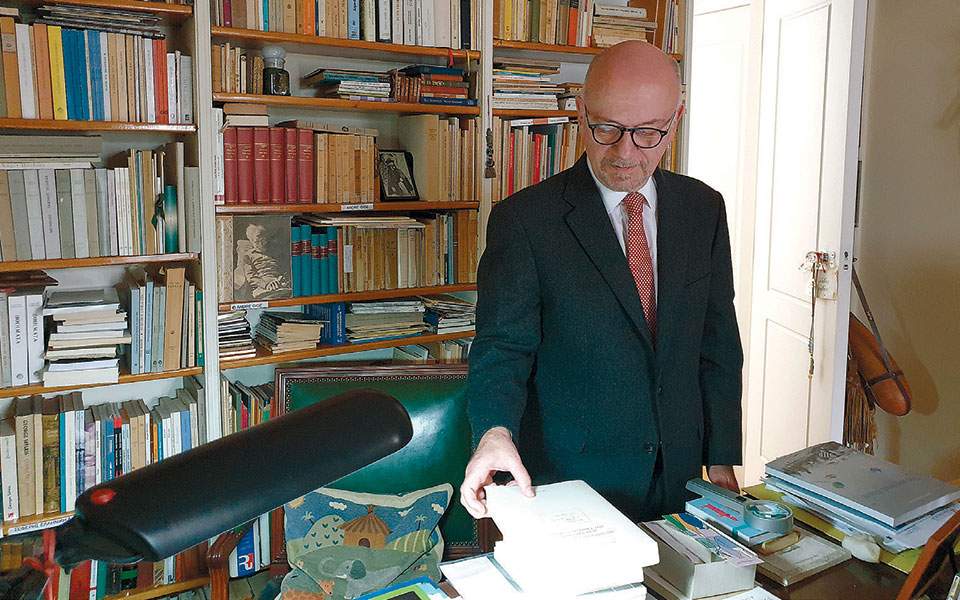The diplomat behind the poet

Exploring the elements that shape great personalities and the principles that define them is a process that is both fascinating and useful. One such endeavor was carried out by Vassilis Papadopoulos, a former ambassador and the general secretary of the Presidency of the Hellenic Republic, in his book “Diplomacy and Poetry: The Case of Giorgos Seferis,” published in Greek by Ikaros.
Apart from a veteran career diplomat, Papadopoulos is also a writer and a Seferis scholar whose career in the Greek diplomatic corps provided him with the ideal vantage point from which to observe and interpret how the award-winning poet’s own diplomatic career influenced his work. By drawing links between turbulent moments in Seferis’ career and his creative process, Papadopoulos provides us with a key for understanding the issues he grappled with, his philosophical underpinnings and his linguistic style.
In your book, you suggest that if Giorgos Seferis were not a diplomat, his poetic idiom may have been different. How do you think his diplomatic career honed his style and language?
Processing experiences and conveying them through the creative process was a tortuous and complicated procedure for the writer, one that was conscious at times and unconscious at others. The first sign of this for me, but also the first thing that triggered my interest, came from studying the result, the poems themselves. In these, as in his journals, I discerned clear traces and influences of his diplomatic life and work, perhaps because I had felt the same way too and it was therefore easier to see.
In my book, I documented these influences in many of his poems and attempted to detect and define the impact of his diplomatic life, no matter how simplistic this may be: Frequently moving to different countries, into new houses, with new friends and points of reference, gave him a constant source of rich material and a different kind of sensibility in his poetry; being away from Greece and placing it in a global context helped him reflect on the fate of man beyond borders and states; and his day-to-day professional involvement with matters of language was an exercise that also shaped his poetic idiom so that it was as unaffected and simple as possible. His style was equally uncluttered in his service documents, many of which I include in my book, as it is in his poems, and I believe that one writing style affected the other, even though he went to great pains to differentiate between his two roles.
Do you believe that the intellectuality Seferis developed from a very young age was the quality that allowed him such independence and confidence in supporting his views, even against his superiors and foreign powers?
I think his confidence stemmed from his character. It is especially apparent in his two journals. I have a feeling that his truly enormous erudition and the constant and profound angst he obviously felt for man, life and the matters of the world strengthened his innate confidence and his sense of self-worth. I find it quite telling that his “Days” journal series was not a confession to himself, as many of his journals were. It was written to be published, therefore he had absolute understanding of the importance of his poetry even though his poems received a very limited response when they were first published. There is a second element that emerges mainly in his “Political Diary”: An exacting personality, he felt contempt for the political leadership of his time, as well as for certain colleagues, and especially so during the Second World War and the Civil War. He watched them act from up close and felt they were beneath the circumstances.
Would you attribute Seferis’ innate pessimism, his aloofness and punctiliousness to the fact that the moderation he was constantly seeking and the courage that he was known for were lacking in intellectual, social and political circles?
People who are strict are strict with themselves first and foremost, and so was Seferis. It’s a very common phenomenon to demand the same high standards of others. Older ambassadors who remember what he was like as a boss would keep saying so back when I first started out at the Ministry of Foreign Affairs. That’s how Seferis is remembered at the ministry. But all of his written work also indicates that he was annoyed by the absence of courage, order and punctuality that he demanded from the people he worked with, but also from his circle of writers and artists, as Odysseas Elytis also points out in “Chronicle of a Decade.”
Moderation and rhythm, as you rightly pointed out, are fundamental elements in the poetry of Seferis. But they were also bigger than that and innate to his character, and would have existed even if he had worked in a different profession or lived in a different country. His pessimism is the same. He was like that even as a student at university, according to his sister, Ioanna Tsatsou, and it was intrinsically linked to the sense of tragedy that is so evident in his poetic point of view. Seferis is the modern tragic Greek poet.
Was Cyprus another Asia Minor for Seferis? Was he scared that it could be lost like Asia Minor was? Could we even say that his anxiety about Cyprus was a psychological transference of the trauma of 1922?
I think that Cyprus impacted him in two ways. On the one hand it confirmed that Hellenism is much larger that the Hellenic state, just as it was in his birthplace and he obviously felt that it shouldn’t be lost as Smyrna was. And in Cyprus, he discovered a part of Hellenism that justified this view. The other way is that Cyprus retained the authenticity of a simple, unrefined and unpretentious way of life, esthetics and overall mentality. It was very different in this regard to Asia Minor, which was very prosperous until the catastrophe. The Dorian image that Cyprus presented at the time was undeniably suited to the poet’s mores. This is one of the reasons why he loved it so much and why he fought as hard as he did as a diplomat for Cyprus.





